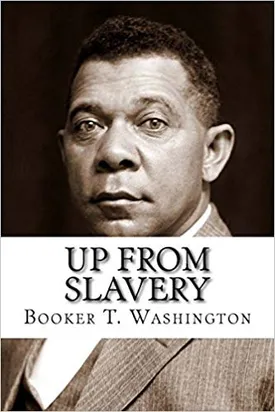Booker T. Washington
Booker T. Washington was an influential African-American author known for his writings on race and education. Born into slavery in 1856 in West Virginia, Washington recognized the importance of education as a means of achieving social mobility. His autobiography, Up From Slavery (1901), quickly became one of the most popular books of its time and spawned a number of subsequent books.
Washington’s upbringing in poverty instilled in him values of hard work and perseverance. He began his life as a slave, but would gain his freedom at the end of the Civil War. Washington attended Hampton Institute, a school for African Americans, and then went on to become a teacher. He served as principal at the Tuskegee Institute for 25 years and taught there for 14 years. Throughout his career, Washington believed in the development of industrial education for African Americans rather than the pursuit of an academic education. He believed a strong emphasis on trade, manual labor, and agricultural training, was the best path for economic independence and progress for African Americans.
Washington was also a strong advocate for civil rights. He spoke out against bigotry and racism, and encouraged African Americans to live in harmony with whites in the South. He formed the National Negro Business League (NNBL), which promoted black businesses and access to capital. In addition, he led the National Afro-American Council, an organization that pushed for civil rights in the late 1800s.
Washington's autobiography, Up From Slavery, is his most notable work and one of the most influential African-American autobiographies ever written. It recounts the experiences of his journey from slave to respected leader. In the book, Washington describes the daily obstacles he encountered while striving to better himself, such as racism and segregation. While Washington acknowledged the struggles he faced, he focused instead on inspiring others to greatness through his own experiences. He also believed that black Americans should strive to achieve through determination and hard work, rather than through violent uprisings or political movements.
Washington went on to write several other books, including Struggle For An Education (1897), The Future of the American Negro (1899), Working and Winning (1900), and My Larger Education (1911). In addition, he published several collections of speeches, including Tuskegee and Its People (1905) and The Story of the Negro (1909). In 1919, he released an autobiography detailing his involvement in the genesis of the civil rights movement.
Booker T. Washington is a powerful legacy in African-American culture and education. His prolific writings and celebrated activism had a lasting impact on the nation. His philosophy of self-improvement, democraticism, and education gave hope to African Americans when none seemed to exist. His autobiography, Up From Slavery, remains one of the most influential and widely read books in American history.

